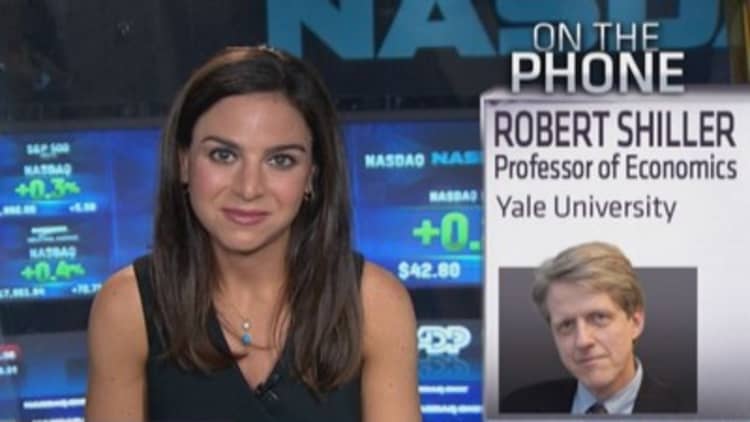
Forget the daily battle between bulls and bears. The most important disagreement in finance revolves around a deeper and more contentious division. It's a civil war that divides Wall Street firms, Nobel Prize winners and even Supreme Court justices—and it leaves ordinary investors wondering what to do with their money.
That would be the fundamental question of whether markets are "efficient." In other words, whether stocks and indexes respond immediately and appropriately to all available information. If they do, trying to beat the market is a fool's game almost certain to result in wasted money and effort, not to mention inferior investment decisions. If they don't, the smartest minds on Wall Street have a serious edge.
This week, the most famous critic of the theory, Robert Shiller, made the case that since stocks have gotten expensive, investors would be wise to rethink their allocation decisions.
"The lesson now is not to go overboard in the stock market, and also to have enough savings for your retirement, because the market is not likely, overall, to do as well as it has in the past," Shiller said on CNBC's "Futures Now" on Thursday.
And while Shiller says that data now show the market as a whole to be in overvalued, and even "bubbly," territory, he says some stocks still offer relative bargains—and encouraged investors to buy those value names.
"There's a time-honored principle called 'value investing,'" he said. " It goes way back to Graham and Dodd in 1934 [when their landmark book, 'Security Analysis,' was first published]. And it still works, I believe. And that is to look among these major asset classes, look for lower-priced components."
Read MoreShiller's 3 rules for investing in a 'bubbly' market
As prudent as that sounds, encouraging people to step back from stocks when they look expensive, and favoring stocks that look valuable, have become two increasingly controversial cases to make.
None other than the godfather of value investing, Warren Buffett, used a letter to shareholders earlier this year to encourage investors to put nearly all their money into stock index products, rather than trying to pick specific stocks or try to time the market.
"The goal of the nonprofessional should not be to pick winners—neither he nor his 'helpers' can do that—but should rather be to own a cross section of businesses that in aggregate are bound to do well. A low-cost S&P 500 index fund will achieve this goal," Buffett wrote.
He added that to avoid "mistiming" the market, investors should "accumulate shares over a long period" and "never sell when the news is bad."
The individual investors Buffett was targeting—who were perhaps already getting sick of the daily flood of stock-picking articles headlined "Invest Like Warren Buffett"—certainly seem to have heeded his advice.
In his shareholder letter, Buffett more specifically advised investors to "put 10 percent of the cash in short-term government bonds and 90 percent in a very low-cost index fund (I suggest Vanguard's)." And as a result, investors added $5.5 billion to the Vanguard fund in the next five months, three times more than the same period in the year prior, according to The Wall Street Journal.
In a more public display of the division, the three 2013 winners of the Nobel Prize in economics included both Shiller and the very developer of the efficient markets hypothesis, Eugene Fama.
And this year, the battle of whether markets function efficiently or not even reached the Supreme Court, when it issued a decision regarding class-action suits against companies.
In the ruling on Halliburton Co. v. Erica P. John Fund, the court overruled a 1988 decision establishing that corporate fraud must be reflected in the price of a stock, given that markets are efficient. Halliburton had argued that "'overwhelming empirical evidence' now 'suggests that capital markets are not fundamentally efficient.'"
And while Chief Justice John Roberts, writing for the majority, said that there hasn't been a "fundamental shift in economic theory that could justify overruling a precedent," he did quote critics of the efficient market hypothesis like Shiller, and ultimately concluded that prices need not always integrate all available information.
The issue can be as much philosophical as it is empirical.
"It comes back to whether you believe that markets work or markets fail," said Zack Shepard of Cincinnati-based Matson Money. "If you believe that markets work, you believe that the price currently is the best estimate of the actual value. If you don't subscribe to efficient markets theory, all you're left with is speculation and gambling with your money—and it's tried and true that that simply doesn't work."
Matson Money has amassed $5.8 billion in funds under management, despite persistently arguing that no one can accurately forecast the future. Its focus is on allocating investors' portfolios appropriately given risk appetites.
So what about the calls of those like Shiller, who probably provides the world's best-respected calls on asset valuations?
"To the extent that you believe markets are overvalued, or that your know which stocks are going to do what—I think that's a belief that markets fail. And I don't believe that," Shepard said, adding: "The graveyard is full of gurus."
—By CNBC's Alex Rosenberg
Watch "Futures Now" Tuesdays and Thursdays at 1 p.m. ET exclusively on FuturesNow.CNBC.com!



